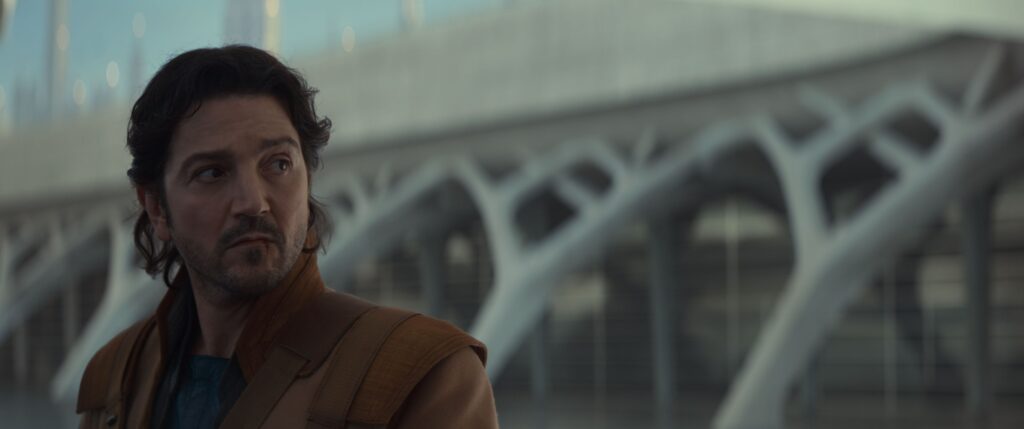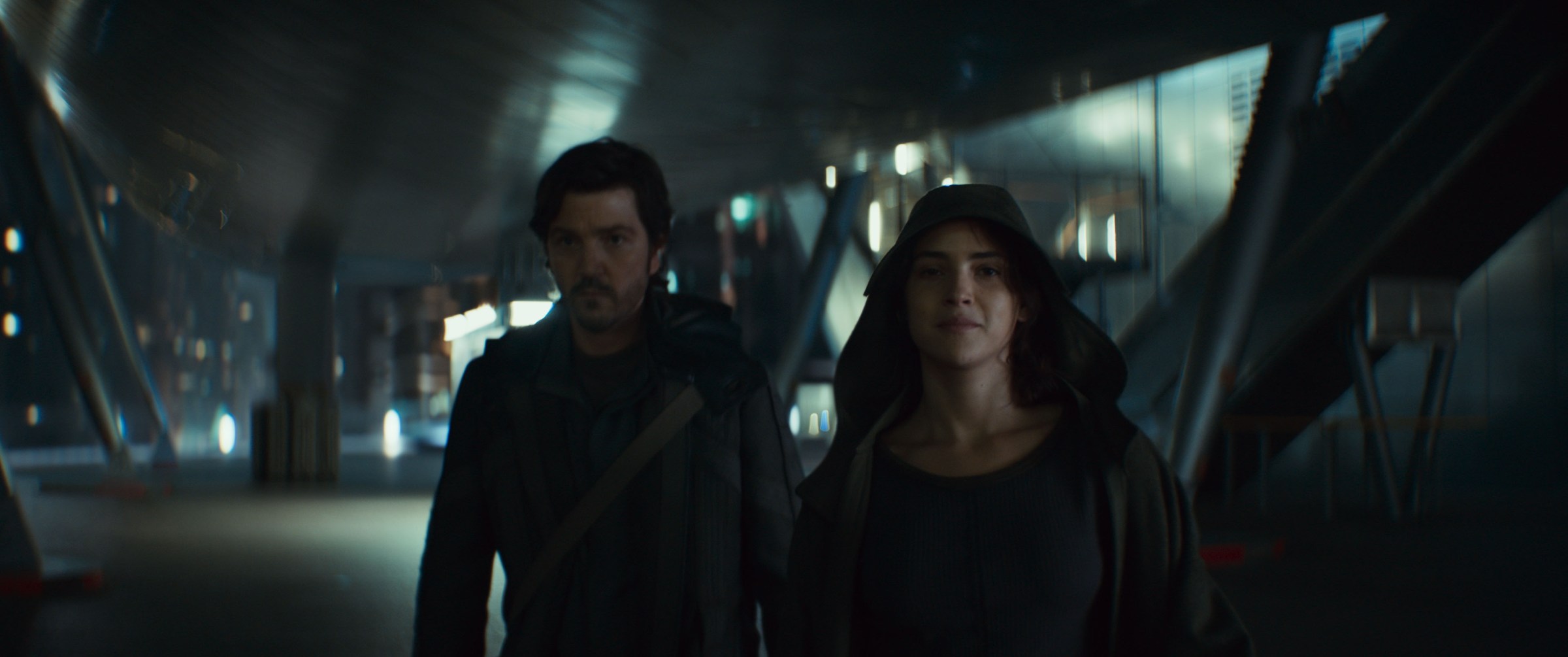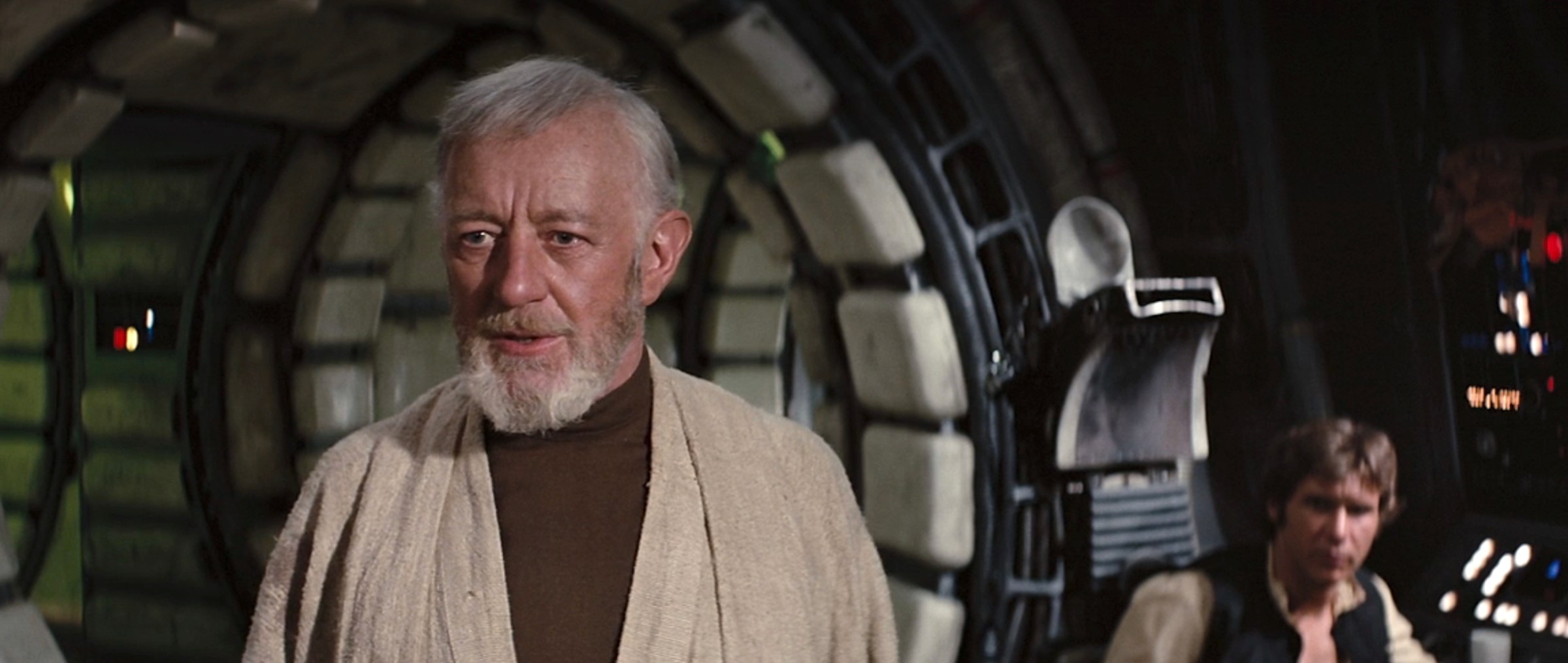As season 2 of Andor heads toward its finale, Cassian Andor (Diego Luna) once again tries to quit the rebellion, in what’s become a running theme throughout both seasons of the show. He’s tired of the risks. He’s tired of being scared. He’s tired of witnessing atrocities. He’s tired of arguing with everyone about next steps for the rebellion, from his handler Luthen (Stellan Skarsgård) to other squabbling rebel factions like the Maya Pei remnant on Yavin or the ill-prepared nascent local resistance on Ghorman. And on top of everything else, he’s also tired of the strain his constant travels for the rebellion have put on his lover Bix (Adria Arjona), and on their relationship.
In episode 9, ironically titled “Welcome to the Rebellion,” Cassian offers Bix a new reason he wants to quit: “The only special thing about me is luck,” he tells her in a heart-to-heart, “and I’ve overplayed my hand already.”
It’s one of many moments in Andor that reads differently if you consider the full history of the Star Wars franchise. Andor creator Tony Gilroy is sparing and deliberate about Easter eggs on the show, but he’s also made a point of connecting the show to Star Wars continuity in large and small ways. (Just look at episode 8’s callback to his Rogue One script, as a hotel clerk tells Cassian “Rebellions are built on hope,” a line Cassian will later deliver to newbie rebel Jyn Erso.)
And while Cassian’s “luck” line isn’t played for drama or emphasis, it’s worth looking back on a classic line from the original 1977 Star Wars: Episode IV – A New Hope. In that movie, Obi-Wan Kenobi is giving Luke Skywalker his first lessons in trusting the Force and connecting to it. Wearing a helmet that covers his eyes, Luke is trying to use his father’s lightsaber to defend himself from stinging blasts from a hovering seeker device. When he manages to block an incoming attack and shut the device down, Han Solo sneers at him: “I call it luck.” Obi-Wan gently responds, “In my experience, there’s no such thing as luck.”
The two of them don’t dig any deeper into that philosophy in that scene. The rest of the movie does sometimes feel like an argument against Obi-Wan’s statement — it could be seen as good luck that the Millennium Falcon gets captured by the Death Star, the one place in the galaxy where Luke and Han can rescue Princess Leia, retrieve the Death Star’s plans, and get them back to the rebellion. It seems like good luck that the Death Star happens to have a fatal flaw buried in its core, and Han seems to take it as luck when Luke manages to target that flaw. (“Great shot, kid, that was one in a million!”)
But A New Hope makes it clear enough that Luke manages his impossible shot by connecting to the Force, and that the Falcon and the Death Star are both at Alderaan for similar reasons, with Obi-Wan trying to meet with Bail Organa on his homeworld and Grand Moff Tarkin punishing Leia by obliterating the planet with her father still on it. And Rogue One reveals why the Death Star had that central flaw — not coincidence, but a desperate act of sabotage by its conscripted designer. In this setting, whenever anything seems too much like coincidence, it’s possible there’s a logical narrative reason for it to happen. And it’s also possible that it’s the will of the Force.
It’s hard to see good luck in Cassian’s own arc sometimes. Almost everything that happens to him in season 1 seems like the result of terrible luck. That starts with the confrontation that kicks the action off in episode 1. The seemingly lucky break of salvaging a coveted Imperial Starpath Unit leads him into Luthen’s hands, and into incredible danger, serving a cause he doesn’t believe in. Eventually, he’s condemned to permanent slavery and torture in an Imperial prison, all for being in the wrong place at the wrong time.
[Ed. note: Light spoilers ahead for Andor season 2, up through episode 9.]
But it’s hard to miss that once Cassian starts making positive moral choices — once he commits to the rebellion, and to fighting back against the Empire’s oppression — his fortunes shift for the better. He’s still perpetually in danger and facing terrifying personal trials, but when his life is really on the line, things tend to go his way.
Suddenly, he’s making it back to Yavin alive with his stolen, experimental TIE Avenger, even though he doesn’t know how to operate it properly. When he falls into the hands of a shattered, fractious splinter of the rebellion, he’s saved by their internal schisms and an out-of-nowhere animal attack. A fortunate coincidence puts Ghorman resistance leader Carro Rylanz in the right place at the exact right moment to save Cassian from Syril, and another perfectly timed lucky break both saves him from K-2SO on Ghorman and puts the droid in his hands for reprogramming. Cassian’s escape from Coruscant with Mon Mothma is one life-saving stroke of luck after another.
But the Star Wars franchise has spent decades following up on Obi-Wan’s New Hope comment, and unpacking how the Force tends to fall on the side of people fighting for freedom and respect for sentient beings. That seems natural enough, given that we’re told in A New Hope that the Force is the energy field created by and connecting all living beings: It seems sensible that the Force would be biased toward those who enhance and build those connections, and help living beings, rather than those who kill living beings en masse. If you don’t think the Force is biased toward light-side users, look at what happens to them when they die, as opposed to what happens to dark-side users. As Qui-Gon Jinn says in a scene in the Revenge of the Sith script (cut from the film, but available on Disney Plus), the ability to live on within the Force after death “is a state acquired through compassion, not greed.”
And it does seem as though whenever Cassian is showing compassion and empathy, whenever he’s fighting back against the Empire’s wholesale cruelty and systemic oppression, the Force is on his side — and powerfully so, as the unnamed Force healer in season 2 implies when she notices him and his “strength of spirit.” She instantly recognizes that there’s something special about him, an element more complicated than luck.
There’s no clear, simple mandate for what the Jedi call “the will of the Force,” though, no obvious rule to getting the Force on your side. If there was, Cassian would probably suffer less, and glide through more of his trials without the constant desperate scramble to stay alive. As Obi-Wan says in the surprisingly nuanced Revenge of the Sith novelization, “The simple truth — if any truth is simple — is that we do not truly know what the will of the Force may be. We can never know. It is so far beyond our limited understanding that we can only surrender to its mystery.”
Certainly there’s no sense that the Force is sentimental about protecting its avatars and chosen ones once they’ve served their purpose for the greater good. Look at how Chirrut Îmwe relies on the Force to carry him safely through a hellish firefight in Rogue One, and dies the moment his crucial goal has been achieved. Rogue One in general leans heavily on Cassian’s luck to get him and his group where they need to be by the end — and they meet similar fates once their desperate mission is successful.
That alone may be a sign that Cassian’s so-called luck only holds when he’s fighting for freedom, when he’s doing what matters most not just to him, but to everyone he helps save. If he and Obi-Wan ever met, the latter would likely have some lessons for him about how luck doesn’t really exist — and Cassian would probably resist those lessons, the way he resists everything the Force healer tries to tell him. Cassian grew up cynical, poor, and desperate. It’s hard enough for him to believe in the higher cause of the rebellion without also believing in a higher power that gets him out of trouble by the skin of his teeth, as long as he’s serving its cause and fighting for the future of living beings.
But notably enough, by the end of episode 9, he still isn’t done with the rebellion — and he still isn’t at the end of his luck, whatever its source. He goes back to fighting the good fight, and he goes back to just barely surviving. He may feel he’s “overplayed his hand,” as he puts it, but the Force isn’t done with him yet.
Content shared from www.polygon.com.



